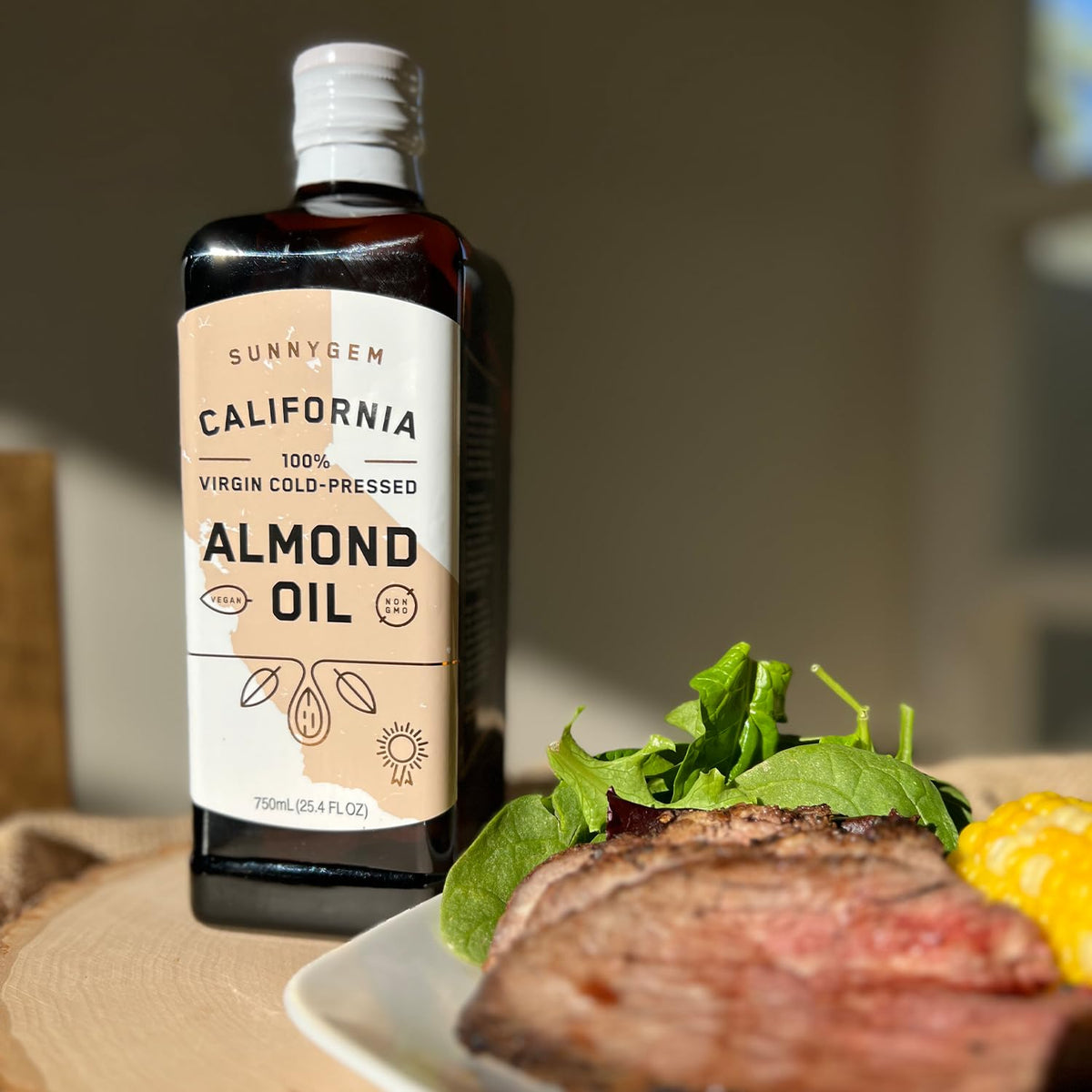- Regular Price
- $19.99
- Sale Price
- $19.99
- Regular Price
- $19.99
- Unit Price
- per

You may be surprised by how incredibly versatile, tasty, and nutritionally power packed this often-overlooked oil is. Almond oil not only adds a subtle, nutty flavor to your dishes but also delivers a lot of health benefits. Let’s dive into five reasons why using almond oil in your cooking is a great choice and why it stands out from other common oils and fats.
Almond oil is incredibly versatile. It’s ideal for sautéing vegetables, searing a steak, baking a cake, or preparing a salad dressing. Its mild, nutty flavor enhances the taste of various dishes without overpowering them. It typically offers a lighter more subtle taste that lets the natural flavors of your ingredients shine through.
As you know, butter can burn easily. It’s important to know that SunnyGem 100% Virgin Almond Oil is unrefined and has a fairly similar smoke point to olive oil (about 325-450°F). This is considered medium or low-medium heat – making it suitable for many cooking methods.
Almond oil is packed with monounsaturated fats, which help lower bad cholesterol levels and reduce the risk of heart disease. Additionally, it contains vitamin E, a potent antioxidant that helps protect cells from oxidative damage.
Unlike butter, which is high in saturated fats, almond oil provides a healthier fat alternative that supports better cardiovascular performance. And compared to soy oil, which often contains processed additives, almond oil is a more natural choice with fewer processed elements.
Using almond oil in your cooking can elevate the flavor and texture of your dishes. Its subtle nuttiness complements both sweet and savory recipes. When used in baking, almond oil can add a delicate almond flavor to cakes, cookies, and muffins, making them more aromatic and flavorful.
For sautéing and frying, almond oil delivers a crisp texture to vegetables and meats. Its light consistency allows it to coat ingredients evenly, ensuring perfect browning and searing, which is often harder to achieve with heavier oils or butter.
Almond oil makes an excellent base for marinades and dressings. Its light, nutty flavor goes great with a variety of herbs, spices, and acids like vinegar or lemon juice. Whether you’re marinating a steak, or whipping up a vinaigrette for your salad, almond oil helps to tenderize meats and blend flavors seamlessly.
Unlike olive oil, which has a more pronounced taste, almond oil’s subtlety allows other ingredients to shine through. The result: your dressings and marinades become more well-balanced and deliciously nuanced.
Finally, a key benefit of almond oil is its ability to retain nutrients – even at high temperatures. Many oils lose their beneficial properties when exposed to heat, but almond oil maintains its nutritional value, making it an ideal choice for cooking.
So, when you’re roasting vegetables or grilling meats, rest assured you’re still getting the health benefits associated with almond oil. This gives it an edge over oils like soybean oil, which can degrade and lose its nutritional value when heated.
Almond oil is a versatile, healthy, and flavorful addition to your kitchen. Whether you’re cooking, baking, or simply dressing a salad, almond oil provides a range of benefits that make it a superior choice compared to butter, soy oil, olive oil, and even avocado oil. Its subtle flavor and nutrient retention make it perfect for a variety of culinary applications. So next time you’re cooking up something special, reach for this hidden gem, almond oil, and take your dishes to the next level.
Enjoy in good health! – Tina
SUNNYGEM FOR COOKING, SKIN, & HAIR
SUNNYGEM FOR COOKING, SKIN, & HAIR
SUNNYGEM FOR COOKING, SKIN, & HAIR
SUNNYGEM FOR COOKING, SKIN, & HAIR
SUNNYGEM FOR COOKING, SKIN, & HAIR
SUNNYGEM FOR COOKING, SKIN, & HAIR
SUNNYGEM FOR COOKING, SKIN, & HAIR
SUNNYGEM FOR COOKING, SKIN, & HAIR
SUNNYGEM FOR COOKING, SKIN, & HAIR
SUNNYGEM FOR COOKING, SKIN, & HAIR
SUNNYGEM FOR COOKING, SKIN, & HAIR
SUNNYGEM FOR COOKING, SKIN, & HAIR
SUNNYGEM FOR COOKING, SKIN, & HAIR
SUNNYGEM FOR COOKING, SKIN, & HAIR
SUNNYGEM FOR COOKING, SKIN, & HAIR
SUNNYGEM FOR COOKING, SKIN, & HAIR
SUNNYGEM FOR COOKING, SKIN, & HAIR
SUNNYGEM FOR COOKING, SKIN, & HAIR
SUNNYGEM FOR COOKING, SKIN, & HAIR
SUNNYGEM FOR COOKING, SKIN, & HAIR




























































SUNNYGEM ALMOND OIL
With 200 years of farming expertise, SunnyGem brings you pure, versatile almond oil for cooking, skin, and hair.
© 2025, SunnyGem Almond Oil
Another awesome website by LM&S
0 comments